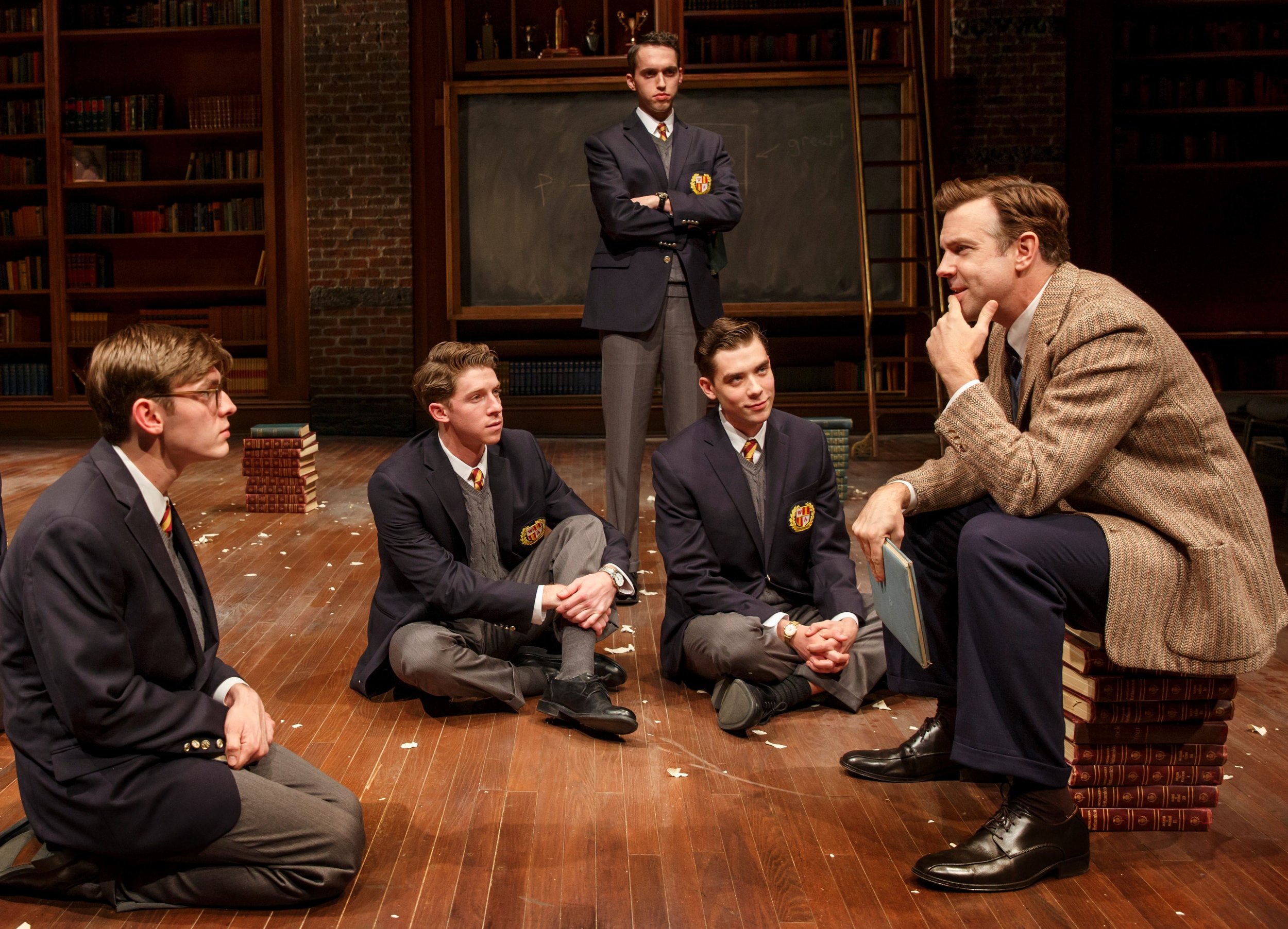Dead Poets Society, a new play written by Tom Schulman, the screenwriter for the 1989 film that starred Robin Williams, Ethan Hawke and Robert Sean Leonard, is a deft, engaging stage version superbly directed by John Doyle for his first production as the artistic director of Classic Stage Company. The story, set in 1959 in a boys’ prep school, Welton Academy, follows a half dozen young men whose lives are affected by John Keating, an English professor. Keating is the kind of teacher who believably inspires his students and urges them to think for themselves rather than unquestioningly follow the rules adults have set out. In its way, Dead Poets Society is a veiled attack on the dangers of fascism that resonates particularly since the election.
For someone unfamiliar with the film, it’s no great leap to suspect that Jason Sudeikis’s Keating is less riotous than Robin Williams was on screen, but he is equally passionate about poetry, particularly the 19th-century Romantics. Sudeikis, best known for Saturday Night Live, is an easily likable presence on stage (he has no other theater credits in the playbill), and he acquits himself very well indeed. Despite the star billing, though, he is only part of a solid, talented ensemble.
The redoubtable David Garrison is Paul Nolan, the iron-willed headmaster willing to give “six of the best” to transgressing students. And the six students are clearly individualized as one comes to care about them, even though none of the actors looks remotely 16 years old: Zane Pais’s stammering Todd Anderson; Bubba Weiler’s bewildered Steven Meeks; Thomas Mann’s would-be actor Neil Perry, suffering under the thumb of his father (Stephen Barker Turner); William Hochman’s Knox Overstreet, who is overcome by hormones and yearns for a young woman named Chris (Francesca Carpanini); Cody Kostro as Charlie Dalton, who invents answers on the spot that sound knowledgeable, usually to no avail, and adopts the identity of a Native American called Nuwanda; and Yaron Lotan’s weaselly Richard Cameron.
As teenagers often do, all struggle with their identities. Todd is aware of his presence as a poorer student amid the rich preppies—his stammer may or may not be a symptom of his discomfort—and Pais unshowily makes him the focus of the group, the one who draws the most sympathy because he doesn’t fit in.
Yet Todd is the witness, really, to the more crucial story of Perry, whose autocratic father has planned his life—he will be a doctor and go to medical school, he will abandon frivolities like acting and yearbook. In Mann’s lovely performance, one can feel the struggle between his soul’s yearning and the guilt that the senior Perry plays on to get his way when an iron fist isn’t working.
Doyle has directed simply but cleverly. His set designer, Scott Pask, forgoes furniture but provides an impressive bookcase extending across the upstage wall, along with a library ladder to reach up high and give characters who use it some visual and spatial variation. The students also assemble stacks of books that serve as seating places, and occasionally stand on them.
There's pleasure to be had, and a tinge of nostalgia, in the love of books that Keating represents. An early moment when he instructs his charges to rip pages out of their textbooks is over the top, but he happily imparts information of all sorts, not just an appreciation of Walt Whitman and Wordsworth.
“Be warned that when you say ‘the hoi polloi,’” he advises Cameron, “you are actually saying ‘the the herd.’ Indicating that you too, Mr. Cameron, are hoi polloi!” Before long, the inspired preppies have re-created the Dead Poets Society, defunct since Keating was a student, that meets secretly to read and write poetry and share secrets. But their blossoming into adults can’t last—at least, not for all of them.
Although the climactic moment echoes the 1960 film Spartacus, the play itself is from an even older mold. As it advocates the importance of the individual amid the pressures of social conformity, it calls to mind Holiday or Harvey or Mr. Roberts or One Flew Over the Cuckoo’s Nest. Even so, the message of Dead Poets Society, both bittersweet and satisfying, is as relevant now as ever.
Thomas Schulman’s Dead Poets Society plays through Dec. 18 at Classic Stage Company (136 E. 13th St.). Performance times vary; for tickets and more information call OvationTix at (866) 811-4111 or visit classicstage.org.




